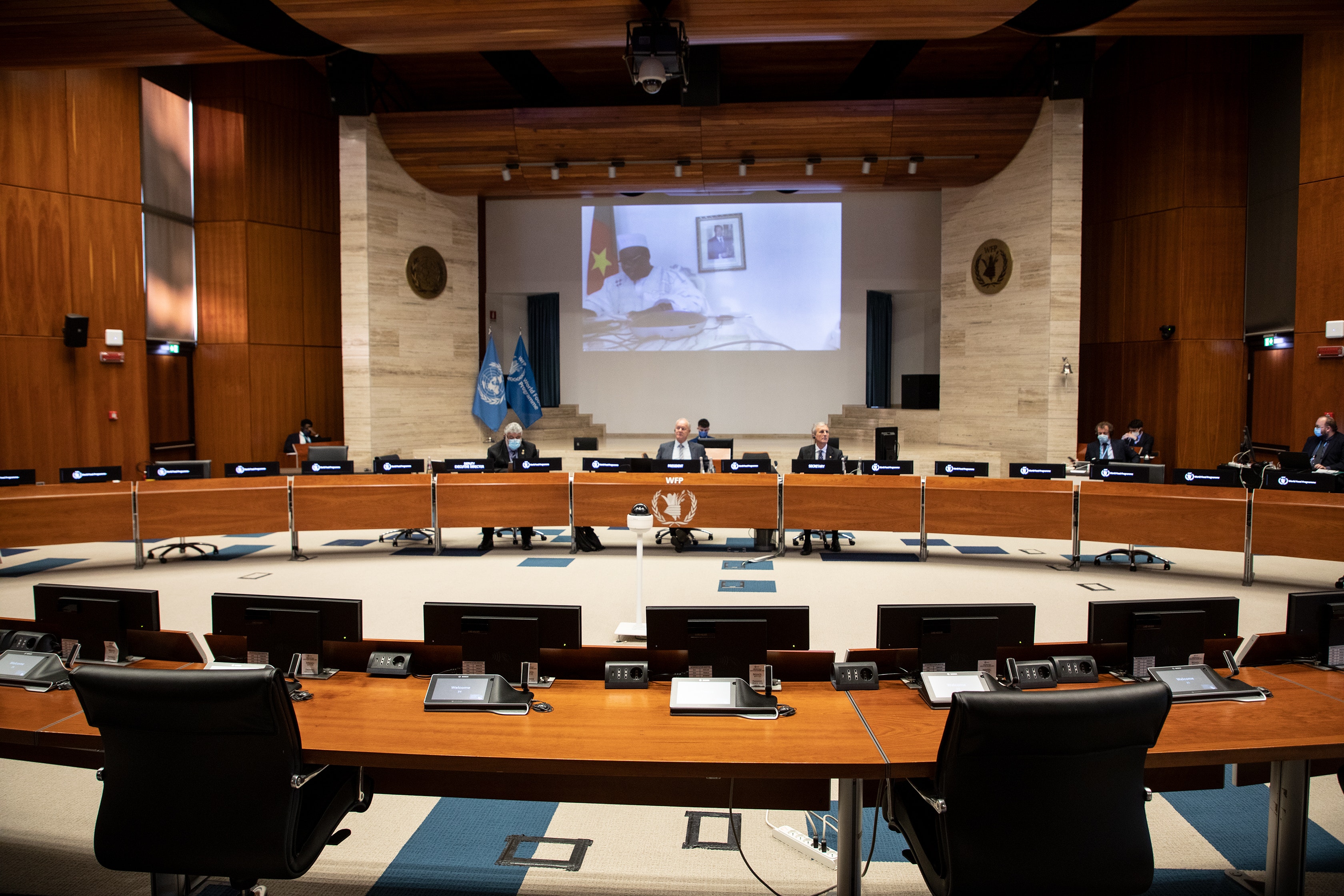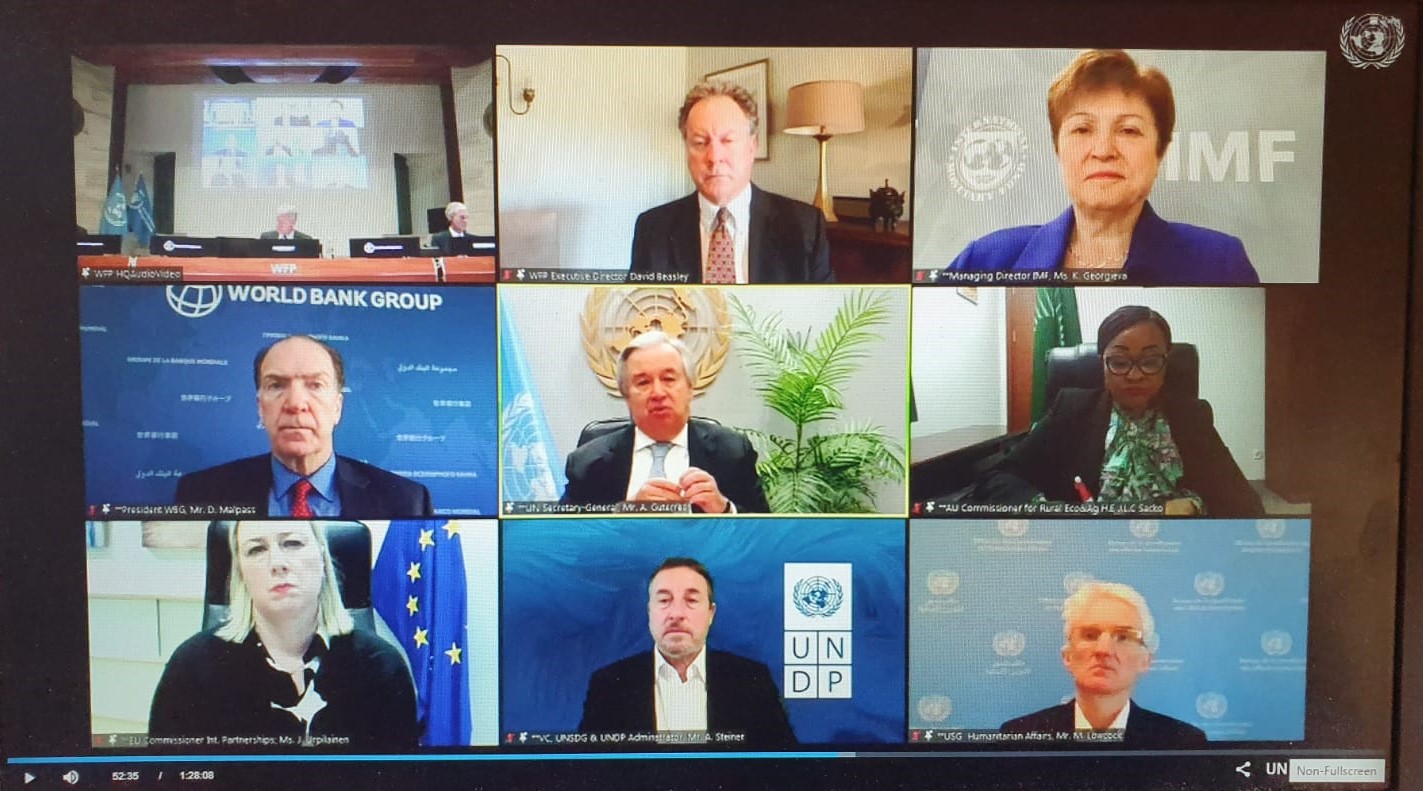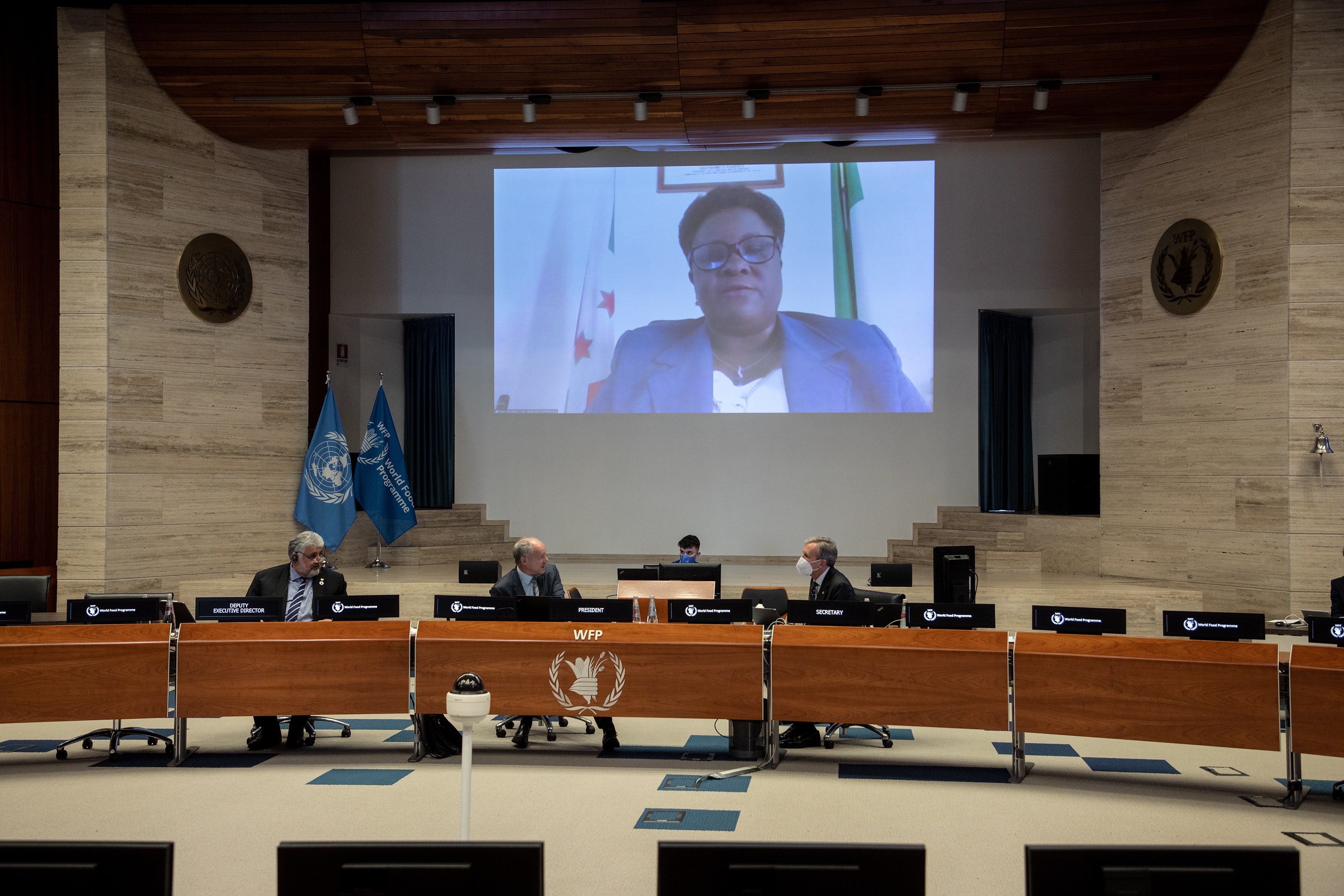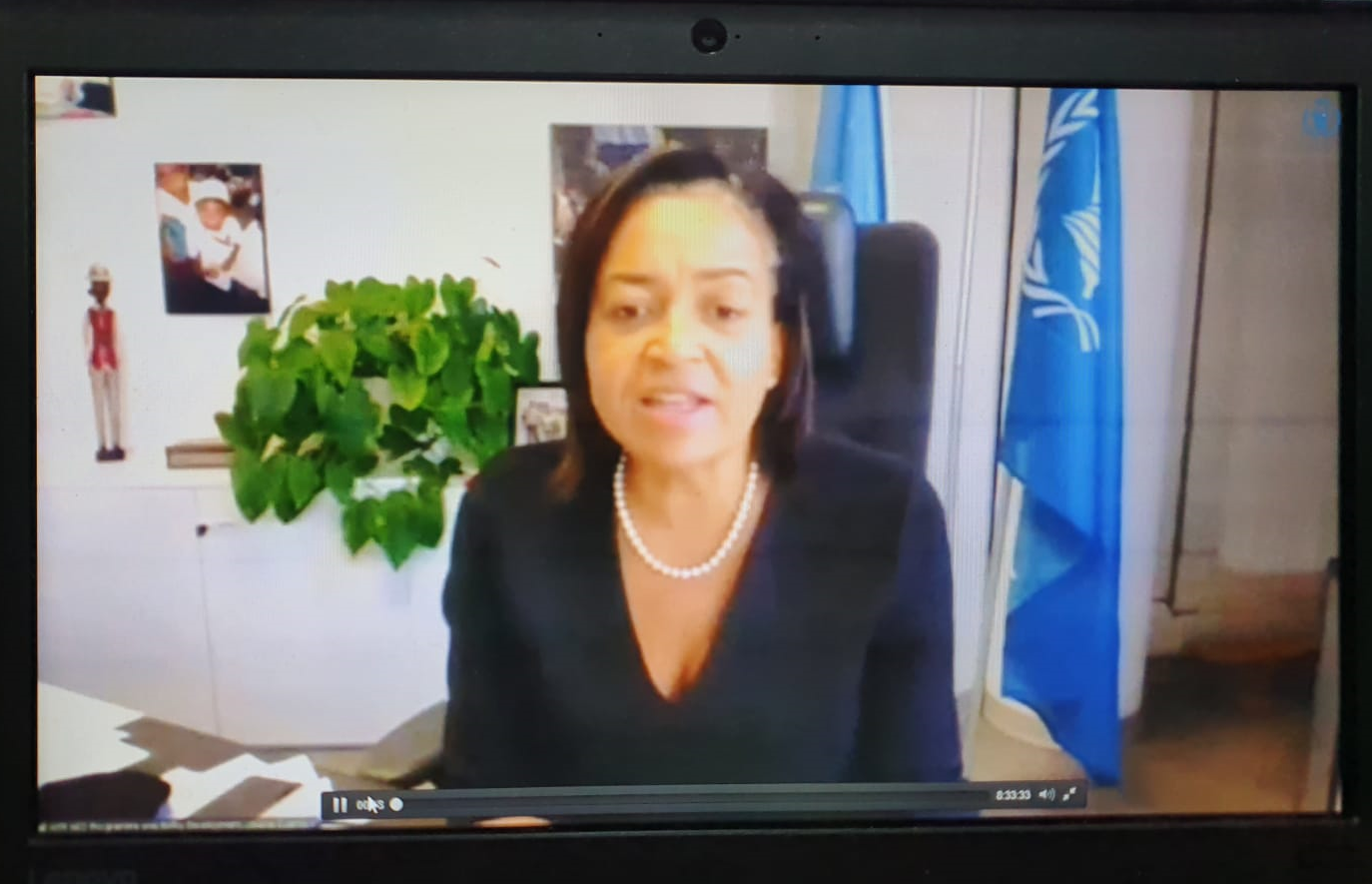The Second Regular Session of the WFP Executive Board 2020 convened from 16-20 November.
In line with the current COVID situation in Italy, the session took place virtually on Zoom with a limited presence in the WFP HQ Auditorium.

The first day of the Second Regular Session of the Executive Board began with the Executive Director’s opening remarks. As the first EB session taking place since the World Food Programme won the Nobel Peace Prize, David Beasley highlighted the importance of this award from the Norwegian Committee as a recognition to the critical work of the organization in its efforts to fight hunger. In Beasley’s words, the Nobel Peace Prize Committee intended to send him two very important messages: “First is thank you for what you have done, for your women and men who are putting their lives at risk every single day to help build peace and stability in places that no one else would want to even be in. The second message, equally powerful, is thank you for what you are going to have to do because of COVID-19.” According to the ED, this Nobel Peace Prize will globally sensitize and raise awareness on the increasing food insecurity, will forge additional relationships and partnerships and bring additional funds to address 2021’s needs. He went on to state that since the current health pandemic threatens to transform into a global “hunger pandemic,” next year is going to be even more complex than this year. The Executive Director thanked the EB Members for their engagement and for “holding WFP accountable and responsible of a higher standard.” He stressed: “We could not have done this without you. This award is just as much yours as it is ours because we are all in it together, we are a family”. Beasley made an appeal for continuous support “in rallying the troops around the world” and asked donors to contribute USD 15 billion to “keep people alive and change their lives.” In his concluding remarks, the ED said: “My excitement has not waned at all about our commitment to ending hunger, and the Nobel Peace Prize gives us greater strength, more energy, more inspiration to do even more.” Click here to read ED’s full speech. In his speech, ED acknowledged that “there is a clear relationship between peace and stability and food security. “You and I are trying to break down the silos of humanitarian and development programmes to work more strategically together because we know when we are out there with joined-up, coordinated programmes, and famine can be eliminated.” This topic was discussed in detail in the afternoon’s high-level event: “Breaking down institutional silos and ensuring more integrated programming, funding and implementation” featuring the UN Secretary-General António Guterres and a panel of high-level representatives from the International Monetary Fund, the World Bank Group, the European Union, the African Union, the UN Sustainable Development Group and the UN Office for Coordination of Humanitarian Affairs. |

H.E. Dr Ulrich Seidenberger, President of the Executive Board, Mr David Beasley, WFP Executive Director, EB high-level event speakers. Key Board Decisions The Executive Board approved the Management Plan (2021–2023) with a 2021 programme support and administrative appropriation (PSA) budget of USD 443.5 million. The operational matters agenda was dedicated to the discussion and approval of the first group of second-generation Country Strategic Plans (CSPs) and Interim Country Strategic Plans (ICSPs): Democratic Republic of the Congo, Guatemala, Indonesia and Togo. The evaluation reports covered CSPs and ICSPs from the first generation: Cameroon, Democratic Republic of the Congo, Indonesia and Timor-Leste. Among the policy and governance documents approved or considered in this session it is worth mentioning the WFP protection and accountability policy and its Implementation plan, WFP disability inclusion road map (2020–2021), Update on collaboration among the Rome‑based agencies, Progress report on the implementation of the comprehensive action plan on the recommendations of the joint Board/management working group on harassment, sexual harassment, abuse of power and discrimination. Click here to find the decisions and recommendations. |

Side events During the Second Regular Session of the Executive Board, the Word Food Programme invited members and partners to participate in two official side events. On Tuesday, Ms Valerie Guarnieri, WFP’s Assistant Executive Director, Programme and Policy Development Department, opened the event on “Strengthening knowledge about school health and nutrition: WFP’s strategic shift towards evidence, data and results”.
Due to COVID-19, around 1.6 billion children are being excluded from schools globally. WFP’s new strategy in support of school health and nutrition broadens the concept of education, to include the wellbeing of children, so that programmes represent a key incentive for families to send their children back to school and to build back schools better. Ms Carmen Burbano, Director of WFP’s School-based Programmes, showcased early achievements in boosting knowledge on school health and nutrition and facilitated discussion over the importance of this data for governments and the whole international community to strengthen an evidence-based approach that ensures no child is left behind. Among the guests and panellists were, H.E. Dr Tariq Al Gurg, Chief Executive Officer of Dubai Cares, Prof. Donald Bundy, London School of Hygiene and Tropical Medicine, Ms Bibi Giyose, Senior Advisor food and nutrition security, African Union Development Agency (AUDANEPAD) and Mr Arif Husain, Chief Economist & Director Research, Assessment and Monitoring, WFP. |

On Wednesday, the Government of Germany, Norway, Denmark and Switzerland co-sponsored the side-event “Anticipating Disasters: Forecast-based Financing in WFP”. WFP presented to the EB Membership and observers itsapproach to forecast-based action in a rapidly changing climate and in the context of the COVID-19 crisis. During the discussion moderated by Mr Gernot Laganda, Chief of WFP’s Climate and Disaster Risk Reduction Programmes, donors provided their perspectives on Forecast-based Financing (FbF) and anticipatory action programs. The event featured several high-level speakers such as Mr Pit Köhler, Head of Division on Multilateral Policy on Humanitarian Assistance, Germany, H.E. Morten von Hanno Aasland, Ambassador and Permanent Representative of Norway, Ms Jette Michelsen, Deputy Permanent Representative, Denmark and Mr Ben Webster, Head of Secretariat, Risk-Informed Early Action Partnership (REAP).
All documents, supplementary information and material from side events related to this EB session are available here. |
